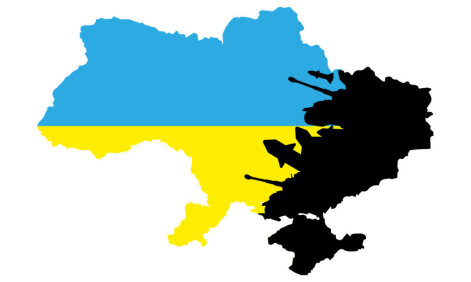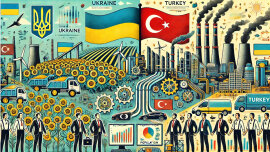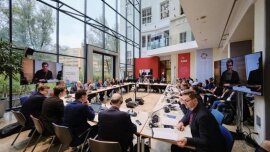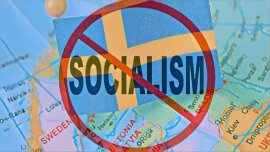Throughout the existence of independent Ukraine, the economy was viewed by the authorities primarily through the prism of the possibility of personal enrichment. The structure and size of state budget expenditures has long been the foundation for the existence of officials at all levels. For them, the main open and secret battles take place, starting from the session hall of the Parliament, ending with the deputies of the territorial communities.
At the same time, the rules and conditions for the formation of the revenue side are limited mainly by the expansion of the tax base and fierce bargaining regarding benefits, regularly adopted along with the budget as amendments to the Tax Code. Small and medium-sized businesses can only follow the next "initiatives" with bated breath, and with fear - the implementation of these "initiatives" by tax officials, customs officers and other officials of various stripes.
It was like this for a very long time, and it is not clear how long it would have continued if the war had not dealt a blow to the already fragile economy of Ukraine. Now we are reaping the fruits of a complete separation of the ruling elites from reality and a maniacal desire to preserve the paradigm of relations between the state and business in the form that existed before all these years.
This paradigm is quite simple - it lies in the thesis that business must be rigidly placed in a fiscal stall in order to balance budget revenues and block all opportunities for the shadow economy. Because we seem to be moving towards Europe, but that's not possible there. Perhaps, under other conditions, this would not cause such fierce resistance from business, if at the same time the quality of our business climate would be European, the efficiency of spending budget funds would be obvious, and the tax burden would be acceptable. But when business is forced to pay taxes honestly, and the deep state does not even think about stopping lining its pockets at the expense of corrupt rent, business, apart from the desire not to pay a penny to the budget, causes nothing.
The war created an entirely new economic reality:
- Reduction of the economy by 45% [1] , more than 50% of enterprises either stopped or significantly reduced their work.
- Decrease in effective demand – taking into account the refugees who left Ukraine [2] and the Ukrainians forcibly deported from the temporarily occupied territories to Russia [3] – the figure will approach 7-8 million people, mostly women and children.
- Reducing the supply of labor, mainly in professions where women were involved.
- Skewed gender supply of the labor force - taking into account the restrictions on the departure of men of draft (meaning working) age.
- The presence of 2 to 6.5 million internally displaced persons, most of them of working age [4] .
- A catastrophic drop in state budget revenues, due to a sharp increase in military spending and a sharp drop in income, from the reasons indicated above.
- Destruction of logistics, primarily international maritime transport.
At the moment, the government is actively concerned with the issue of providing housing for internally displaced persons, mainly because in the troubled waters of state building, personal enrichment will become more common. However, in an attempt to solve an unconditionally important problem with the residence of refugees, a much more explosive problem is lost, which can blow up a society that is at war with an external enemy from the inside. This is the coming unemployment problem.
The average family has a reserve of savings for a maximum of 3-4 months [5] . Even having moved to the relatively calm regions of Western Ukraine, taking into account the factors mentioned above - the labor market of these regions will not be able to digest such a large amount of labor - there are simply no jobs. Even if we assume that the state will provide these people with housing, what will these people live on? For monthly assistance from the state in the amount of UAH 2 thousand per person? Probably, officials who determine the amount of such assistance have not visited the nearest supermarket for a long time, if they assume that a person can live on such an amount, especially against the backdrop of accelerating inflation.
The question arises from this - what is the point of building housing for migrants where there are no jobs? The correct answer is none, except how to properly master the budgets.
In addition, this reveals the result of many years of efforts by the state to systematically destroy the business climate. According to the World Bank estimates, for 2019 Ukraine occupies only 64th position out of 194 countries in terms of Easy doing business [6] . Of course, one can object that deregulation reforms are a complex matter, but the same Turkey in 2016 ranked 69th (Ukraine 80th), and in 2019 Turkey was 33rd [7] . This is about the desire to change something.
It is clear that during the war it is stupid and useless to talk about improving the business climate. But society needs to understand that, in fact, the problem of impending large-scale unemployment will hit absolutely everyone sharply. Unemployed men without a livelihood, not involved in hostilities, in a country stuffed with weapons - create a very explosive mixture. They could be used in defense or in the military-industrial complex, but there is simply no need for such an amount of labor. In addition, these areas require a fairly lengthy professional training - yesterday's accountant or lawyer will not be able to abruptly become a turner of the 6th category or an experienced artilleryman.
However, the state is practically inactive on this front. In addition to the corruption component, there is a mountain of problems accumulated during peacetime:
- The state has no understanding of the objectively existing structure of the economy. According to various estimates, the level of the shadow economy ranges from 23.8% in 2020 according to the National Bank of Ukraine [8] to 45-47% (for 2018) according to international organizations [9] . Firstly, such a difference in estimates allows us to seriously doubt the objectivity of the NBU data, and secondly, in any case, the volume of the shadow economy, shadow employment is enormous. This means that the state has no idea either about the sectoral structure of the economy or about the real level of employment. Therefore, it is unlikely that studies based on distorted data will give any understanding of the actions of the state under various scenarios for the development of the war [10] .
- For all the years of Ukraine's existence, the state economic policy has not been focused on creating jobs. There is no general practice, no effective (tested in Ukrainian conditions) tools for stimulating economic policy, either in the administrative, financial or fiscal sphere. Accordingly, the state does not have the tools to encourage entrepreneurs to take on the existing risk and invest in the expansion (creation) of production. And a number of initiatives in wartime are frankly wrecking in nature [11] .
- Based on this, there is no understanding of which industries have relative competitive advantages, primarily export ones, due to a sharp reduction in the domestic market, how much labor they will absorb if they expand, and how many additional jobs they will create in related industries and which ones. What locations are necessary (convenient) for the organization (expansion) of production and where exactly - including in terms of the availability of resources (connection of electricity, water, gas). Because, in particular, it would be the most logical place to build housing for migrants.
- In terms of the overall level of technological complexity, the Ukrainian economy in 2019 ranks 42nd [12] in the world (for example, Turkey is 38th, Poland is 24th). The whales of our economy are production inherited from the time of the collapse of the USSR or slightly modernized (metallurgy), raw materials production (primarily agriculture) or their primary processing (vegetable oil production). Obviously, we do not have a sufficient quantity and quality of industries that can be transferred in a short time to the western regions and whose expansion can absorb such a quantity of labor.
According to official data [13] , the main items of Ukrainian exports in the first half of 2021 were:
products of the agro-industrial complex and the food industry (36.1%) - even in war conditions, 60-70% of the area will be sown, even taking into account the shortage of fertilizers and the corresponding drop in yields - the crop more than covers domestic consumption. The problem remains and will be the lack of maritime logistics, which means reorientation to rail logistics, which will not cover the required volume of transshipment to the western borders.
products of the metallurgical complex (23.5%) - most of the production and related industries are concentrated either directly in the war zones or in the immediate vicinity, there is certainly no question of any expansion. Logistics problems are the same as in the agro-industrial complex. However, even existing production facilities are able to maintain export potential, but of course in much smaller volumes.
mineral products (15.4%) - primarily ore, the problems are the same as the products of the metallurgical complex
engineering products (10.1%) - due to the high complexity of production - the slightest failure in the supply chain of components automatically means a stop in the production process. In addition, the lion's share of exports went to the Russian Federation and the CIS countries - for obvious reasons, it was completely stopped. Here, the expansion or relocation of production is practically impossible.
products of the chemical industry (5.5%) are mainly the production of fertilizers, the relocation of enterprises is impossible due to the complex technological cycle, the problems with logistics are the same as in other industries.
wood and paper pulp (3.9%) - there is potential here, since primary woodworking is not such a complex technological process, and most of the sources of raw materials are located in Western Ukraine and Polissya - expansion of production is quite real, and logistics has not suffered so much.
light industry products (2%) – the relocation of production is quite real and the production itself is labor-intensive enough that it could absorb the labor force.
Consideration should be given to factors that severely limit the existing room for maneuver:
- Time. The technological process should be simple enough so that both the time of its organization and the time of training the workforce are minimal.
- State. In Ukraine, complex production is absent for the most part not by chance. Any state intervention in the Ukrainian version is disastrous for any business. Therefore, the fewer permits required to open and operate a business, the better. Unfortunately, this also determines the level of complexity of productions as basic.
- Dimensions. In the conditions of war, the fair logic regarding the greater profitability of large industries is faced with the possibility of being physically destroyed by Russian missile strikes. Accordingly, it is better to have fewer small industries, even compactly located, than one large one.
- The absence of a systemic state order that stimulates domestic consumption. Despite the optimism of some economists, I do not believe in the rationality and significant change in government economic policy. If there is a state order, then it certainly will not prioritize the creation of the maximum number of jobs.
At the same time, a number of factors work for us even in such difficult times:
- Extremely high ability of horizontal communication and self-organization. As war has shown, it is a unique and most effective mechanism for counteracting an external enemy in society in the face of inaction and slippage of state mechanisms.
- Real, not declarative support for Ukrainian society by Western societies (not to be confused with Western elites). They understand that Ukrainians, at the cost of their own lives, are also defending their (Western societies) right to freedom and determine their future, a right that Western leaders are only ready to declare. In this context, the brand of Ukraine's authenticity and the values that its people stand for can and should be transferred to everything that Ukraine produces - from metal structures to food.
As an example, based on the above, possible export industries, primarily to the EU countries, capable of absorbing labor could be:
- Manufacture of metal structures from domestic rolled metal products. Unfortunately, we will not build complex machine-building productions in a short time, but relatively simple products (such as car trailers, sea containers - quite well). It would be ideal - the production of spare parts - this would integrate Ukrainian production into the complex technological chains of world technological leaders.
- Small farms - this would solve the problem of refugees living, the problem of employment, would form a food security cushion. Such farms could be concentrated on small-scale dairy production, organic livestock and poultry production, and production of niche crops that do not require large areas under crops.
- Production of food semi-finished products - for example, frozen vegetables, bakery products. Simple production, especially with its own resource base.
- Animal husbandry, export of meat and meat semi-finished products, especially environmentally friendly.
- Primary woodworking, furniture production.
- Light industry.
It is clear that this list is very conditional, but the fundamental principle is this - based on the existing export resource base, look for areas that involve the maximum amount of labor. Of course, administrative restrictions (for example, allowing men of military age to travel abroad) play an important role here and can significantly reformat the supply of labor. However, many refugees would be ready to return to Ukraine, understanding how they can feed their families in their homeland.
As a source of financing, horizontal links could stimulate the creation of private Western funds to support and create enterprises, including the supply of production lines, technical assistance in the fastest possible organization of production, loans for rent / purchase / organization of small farms. Also, horizontal communications could provide a study of demand in the EU countries and access to distribution and / or retail networks. At the same time, loyalty to Ukrainian brands and the desire of Western societies to contribute to the struggle of Ukraine not only by their attitude towards refugees (which they have already proved), but also by their own consumption would be significant factors contributing to the growth in demand for Ukrainian goods.
Within the country, horizontal communications are many times faster able to organize information and profile support both in the organization of production and in the organization of distribution systems than any government programs.
Unfortunately, the vector of economic policy in war conditions is definitely not aimed at a qualitative solution of unprecedented economic challenges, and in some areas it has not only failed, but also has a pronounced corruption tinge.
In such conditions, it makes no sense to count on any tangible assistance or at least steps in organizing the solution of problems from the state. In this form, the state apparatus is not subject to any reform - only total demolition. However, refugees have no time to wait for the dismantling of the state apparatus and deep reforms - from the judiciary to the fiscal - these people, already disadvantaged by the war, have the right to have hope for a decent life here, in their country, right now.
[1] https://www.worldbank.org/en/news/press-release/2022/04/10/russian-invasion-to-shrink-ukraine-economy-by-45-percent-this-year
[4] https://www.dw.com/uk/%D0%B2-%D1%83%D0%BA%D1%80%D0%B0%D1%97%D0%BD%D1%96-% D0%B2%D0%B6%D0%B5-65-%D0%BC%D1%96%D0%BB%D1%8C%D0%B9%D0%BE%D0%BD%D1%96%D0%B2 -%D0%BF%D0%B5%D1%80%D0%B5%D0%BC%D1%96%D1%89%D0%B5%D0%BD%D0%B8%D1%85-%D0%BE %D1%81%D1%96%D0%B1/a-61180611
[5] https://rb.com.ua/uk/blog-uk/omnibus-uk/ocinka-ukraincjami-materialnogo-stanovishha/?fbclid=IwAR19vQT9NH36R16Ta6L8g5hUUOuQOCv62ecK3vWN9yyP8s0Q6Lp0tdkb3tQ

























